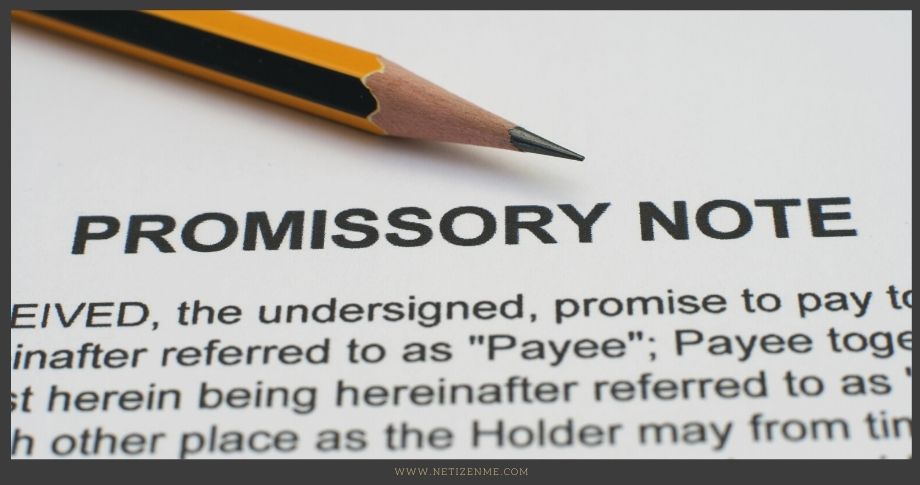Promissory notes: Do they stand up in court? They do provided the borrower’s borrowing and repayment conditions are clearly disclosed and signed.

Promissory notes: Do they stand up in court? They do provided the borrower’s borrowing and repayment conditions are clearly disclosed and signed. Promissory notes are financial instruments used to record the conditions of borrowing and lending money.
Table of Contents
Characteristics of a Promissory Note
Promissory notes include the amount borrowed, the borrower’s name, the lender’s name, the parties’ addresses, and so on. If the borrower fails to pay the money back when it is due, the lender may bring a civil action to recover the funds.
A promissory note has the following characteristics:
Borrowing date
Date of repayment agreed upon
The interest rate (if any)
Repayment method
Recipient of reimbursement
The borrower’s signature
The lender keeps the note after the borrower signs it as verification of the loan’s conditions. A copy is normally supplied to the borrower.
Promissory Note Varieties
Although basic aspects are shared by all promissory notes, there are several types of promissory notes. They are classified according to the kind of loan or the purpose for the loan. However, all promissory notes, regardless of kind, are legally enforceable contracts.
The following are the most prevalent forms of promissory notes:
Promissory notes issued to individuals
Commercial promissory notes
Promissory notes for real estate
Promissory notes for investments
Promissory Notes (Personal Promissory Notes)
This kind of promissory note is intended to retain a personal record of a loan or loans made between two organisations. Though it might be awkward to utilise legal papers when doing business with family and friends, it is a good practise to do so in order to avoid misunderstanding and strained relationships in the future. A personal promissory note demonstrates that the borrower wants to repay the money and provides security to the lender.
Commercial Promissory Notes
Commercial lenders often employ commercial promissory notes. This kind of promissory note is often more stringent than a personal promissory note. If the borrower fails to repay the loan as promised, the commercial lender has the authority to demand immediate repayment of the whole loan amount. In certain situations, the business lender has the legal right to keep the borrower’s property until complete payback is made.
Promissory Notes on Real Estate
A real estate promissory note is similar to a commercial promissory note in that it generally entails the seizure of the borrower’s property, such as their house or other value, until it is fully repaid. A default on a real estate promissory note may also become public record.
Promissory Notes for Investment
A business contract is frequently the subject of an investment promissory note. These notes are used to support a company. They usually include provisions that describe predicted returns on investments for specified time periods.
Recipient of Repayment
“Pay to the order of” is a phrase that appears on promissory notes from time to time. It signifies that the borrower promises to pay to the lender’s instruction.
In other words, by signing the note, the borrower, also known as the “maker,” accepts responsibility for returning the borrowed money to the lender or whomever the lender designates as the beneficiary of the repayment. This implies that the borrower might be required to pay the lender’s spouse, brother, friend, or even someone who owes money to the lender.
What Is a Promissory Note and How Do I Sign It?
The manner in which a promissory note should be signed is governed by state legislation, which varies. Promissory notes are needed to be witnessed in certain states, but not in others. Some states require notarization of promissory notes, while others do not.
Mortgages, Promissory Notes, and Foreclosures
Promissory notes are sometimes utilised when applying for loans to acquire real estate. In such circumstances, the lending company frequently contracts an agreement to legally seize the borrower’s property if the borrower fails to repay the debt in full when it is due. A mortgage is a term for this kind of transaction.
If the borrower fails, the mortgage-holding corporation may take legal action to sell the borrower’s property and use the revenues to pay off the debt. The legal procedure outlined above is known as a foreclosure.
Default on Payment
Failure to repay a loan as agreed upon by both the lender and the borrower may be resolved via a legal action adjudicated in a civil court. However, providing incorrect information on the promissory note or while asking for the loan counts as fraud, which is a criminal violation.
